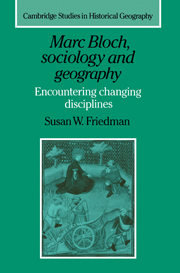Book contents
- Frontmatter
- Contents
- List of tables
- Acknowledgments
- A note on translation
- List of abbreviations
- Introduction
- 1 Marc Bloch and the “Université”
- PART I Sociology, geography, and history during Marc Bloch's years of apprenticeship
- 2 Marc Bloch's training as a normalien
- 3 History under attack
- 4 The quest for identity in Vidalian geography
- 5 From the Fondation Thiers to the doctorate: Marc Bloch's emerging perspective
- PART II Marc Bloch as a critic and practitioner of sociology and geography
- Notes
- Index of names
- Subject index
- Cambridge Studies in Historical Geography
5 - From the Fondation Thiers to the doctorate: Marc Bloch's emerging perspective
Published online by Cambridge University Press: 23 November 2009
- Frontmatter
- Contents
- List of tables
- Acknowledgments
- A note on translation
- List of abbreviations
- Introduction
- 1 Marc Bloch and the “Université”
- PART I Sociology, geography, and history during Marc Bloch's years of apprenticeship
- 2 Marc Bloch's training as a normalien
- 3 History under attack
- 4 The quest for identity in Vidalian geography
- 5 From the Fondation Thiers to the doctorate: Marc Bloch's emerging perspective
- PART II Marc Bloch as a critic and practitioner of sociology and geography
- Notes
- Index of names
- Subject index
- Cambridge Studies in Historical Geography
Summary
After his year in Germany, Marc Bloch spent three years at the Fondation Thiers, then two as a lycée professor, and almost five in uniform. His writings from this decade reflect both his predoctoral status with the Université and his reactions to the on-going debates over the relative merits of history, geography, and sociology. His developing critical stance toward géographie humaine and his increasing attraction to Durkheimian thought can be detected in a monograph on “l'Ile-de-France,” his dissertation, and a number of articles and reviews. Despite his interest in the new methods, the approach which he took in his published work remained very much like that of his teachers – a reflection of not only his junior status but also of the disruptions of war. He focussed on a careful interpretation of documents related to the history of France and made only limited use of the concepts and methods promoted by the Durkheimians.
In 1909 Bloch entered the Fondation Thiers, which had been established in 1893 as a residence in Paris for a very select group of doctoral students following their successful completion of the licence (an academic certificate acquired a few years after the baccalauréat) or an equivalent diploma.
- Type
- Chapter
- Information
- Marc Bloch, Sociology and GeographyEncountering Changing Disciplines, pp. 74 - 90Publisher: Cambridge University PressPrint publication year: 1996



